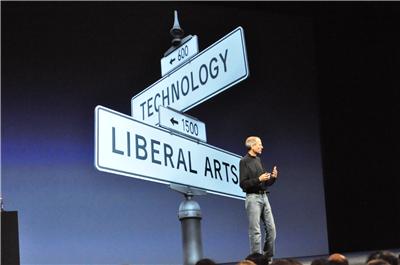We all know the broad strokes: a boy is born to a graduate student and her Syrian boyfriend. She places the boy for adoption. He comes to live with Paul and Clara. The boy grows up in Santa Clara county. It’s flat, lots of one story buildings, mostly middle/upper middle class, outside of the bad parts. Parts of it are pretty, parts aren’t. He wasn’t coddled. His biological mother makes his adoptive parents promise to send him to college. In fourth grade he has a great teacher and, presumably, another and another.
His parents scrape to send him to Reed. He drops out of college and starts dropping in on classes that interest him. He makes money returning bottles and he hits the Hare Krishna temple now and then for a free meal. He takes calligraphy, eschews the typical coursework, and at age 20 he and a buddy start a company.
He’s a buddhist with a temper. He cuts down rivals and builds up a team of 4,000 dedicated to his singular vision. He’s ousted, builds another company or two, and comes back. He’s kind of a hippie, enjoying Bob Dylan and the Beatles. He loves music.
He’s leaving, now, the victim of something gnawing at his health like sea spray whittles a wooden pier.
Where does that leave Apple? And where does that leave us?
I wasn’t always a Mac lover. I thought they were over-priced and pretty, the candy colors far too silly for my 486 tastes. Any chip that had the word Power in its name was overcompensating, I wagered.
But over the past decade I learned the satisfaction of a machine that just works. It’s a machine that the boy put most of his life into, a machine that has the heart of a much older thing, a thing that lay blinking and frantic in a Stanford computer lab somewhere and then, over time, shrank down to something you and I can fit into our pockets.
Many complained that the ecosystem that he created was a walled garden, but I’d equate it to a pasture. “The reason everything looks beautiful is because it is out of balance,” wrote Zen master Shunryu Suzuki. “But its background is always in perfect harmony.” In the front, anything can happen. In the back, perfect calm and order.
There is a strain of Internet thought that requires us to tear down, to refuse to see the other side. There will be plenty of that going on in the next few days as talking heads talk. But name one CEO who, on leaving his company, will raise such a wave of well-wishes and interest? When Michael Dell dodders off or Howard Stringer plops into a club chair for his final cigar, will anyone care the next day?
We all know the broad strokes: The man got sicker, he almost quit, kept at it. He embraced a successor and groomed him to be as calm a force as he once was. He kept us surprised, entertained, constantly speculating. We wondered where he was. If he was well.
We all know the broad strokes: He isn’t well. He’s stepped down. Another Buddhist (or near enough to one) said “The mark of the immature man is that he wants to die nobly for a cause, while the mark of a mature man is that he wants to live humbly for one.”
Godspeed, Mr. Jobs. We’ll miss you.
